当前位置:首页>>details
With a theme of Raising Standards and Creating Value for Greater Industry Development, CVCA Annual General Meeting & China Venture Capital/ Private Equity Summit was held successfully in Beijing on November 17-18, 2010. As one of the most important and recognized summits in China's VC/PE industry, it attracted over 300 guests ranging from VC/PE investors, government officials, academics to financial service providers. Distinguished guest speakers from the government included Mr. Zhongmin WANG, Vice-Chairman of National Council for Social Security Fund, and Mr. Wenlian CAO, Deputy Director-General at the Department of Fiscal and Financial Affairs of National Development and Reform Commission. Dr. Shusong BA, Vice Director-general & Research Fellow at Financial Research Institute of Development Research Center of the State Council and Dr. Dong TAO, Managing Director and Chief Regional Economist of Credit Suisse also delivered keynote speeches. The participants gathered to communicate and share best practices on the following issues in China's VC/PE industry: Expansion Sources and Opening of Channels for RMB Fund-Raising; The Supervision and Policy Environment for RMB Funds; Fund Internal Legal and Financial issues; Fund Operations Management as well as the latest buzzword issues of Venture Capital and Private Equity investment in China.
AGM Photo Album

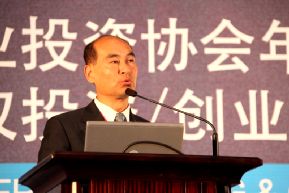
Speaker: Zhongmin WANG, Vice-Chairman, National Council for Social Security Fund
Mr. Zhongmin WANG gave the keynote speech regarding monetary policy and the development of private equity. The entire Chinese monetary policy is based on the idea of loose monetary regulation with tight credit restrictions. The deposit-reserve ratio was frequently used as the main tool for regulating the market. The adjustment of the monetary policy would bring investment opportunities in new industries and promote the cooperation with state-owned and private enterprises.
Mr. Wang also indicated that the external and internal monetary policy is regulated under the global environment of industry's structural change and new industry development. During this process, the PE fund has been the most stable and profitable among all types of capital investments. Mr. Wang said that it is a good era for private equity. PE funds needs to manage its inner structure and take advantage of global trends and China's monetary policy.
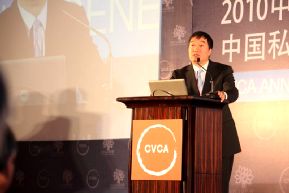
Speaker: Wenlian CAO, Deputy Director-General, Department of Fiscal and Financial Affairs, NDRC
Mr. Wenlian CAO delivered the other impressive Keynote Speech. Mr. Cao mentioned that the State Council had a favorable view to the VCPE industry as evidenced several times in documents in 2010. In September, the executive meeting of the State Council approved , which specially mentioned to strive to develop PE and VC industry. Meanwhile, Mr. Cao indicated that appropriate supervision is necessary for VC/PE's proper development. The reasons are as follows.
VCPE industry is a leveraged industry.
A great deal of information is not published in VCPE industry. In order to preclude private profit transformation and illegal insider transactions, supervision is thereby necessary.
With the expansion of the industrial scale, some merger and acquisition transactions may impact the market negatively and lead to some systemic risks.
Supervision is also essential during the process of fundraising. We need to define and prevent the risks and protect LP's interests.
The industrial chain is being established with a great number of agencies.
In this case, during the twelfth-five year plan, there should be an overall plan to implement appropriate, efficient supervision. In the current situation, efficient supervision focuses on fundraising process, private profit transformation and insider transactions as well as investment orientation.

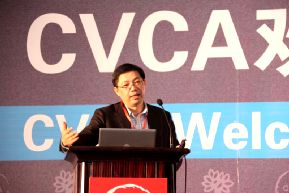
Speaker: Dr. Shusong BA, Vice Director-general & Research Fellow, Financial Research Institute, Development Research Center of the State Council
The distinguished guest speaker, Dr. Shusong BA delivered a speech titled China's Financial Policy Trends and the Twelfth-Five Year Plan.
Dr. Ba analyzed five characteristics of economic growth which might appear during the twelfth-five year plan.
1. China's economy is in a new cycle of economic development and will step into a more regular growing trend in 2011.
2. The economy is growing from a high starting point and the space for continuous rapid increase was limited. Macroeconomic controls should prevent the economy's excessive growth, which may boost pressure of inflation.
3. Per capita GNI is now comparable to middle-income countries and is still developing rapidly.
4. Economy's structural adjustment and urbanization are core motivations for economic growth.
5. An appropriate economic growth rate could range from 8% to 10%. The mid-line of potential economy increase ratio can be managed around 9%.
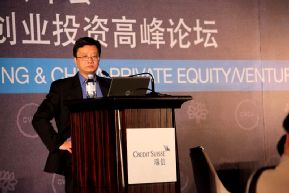
Speaker: Dr. Dong TAO, Managing Director and Chief Regional Economist, Non Japan Asia, Credit Suisse
During the luncheon of the summit, Dr. Dong TAO presented his impressive ideas about "The Great Structural Change Ahead in China". China experienced three periods of accelerated growths which lasted for 5-6 years. There were always "super factors" to support these growth periods. Two super factors during the last growth phase were joining WTO and the real estate boom in China. However, "super factors" cannot be predicted. Although economic growth has rebounded recently, "super factors" have not emerged. More attention must be paid to periods of slow growth.
According to Dr. Tao, another "super factor" to stimulate the economy's fast growth is urbanization. A city consumer spends 12,000 RMB annually while a rural consumer spends less than 4,000 RMB. When the rural population becomes main consumers, this will provide the impetus for the next dramatic increase in China's economic growth. The focus of the Chinese government's mission will change from GDP growth to the allocation of benefits accrued from the growth. The salary for rural migrant workers would increase, and China's fortune would increase dramatically as well. The two main forces for China's development are the wealthy elite and low-income people.


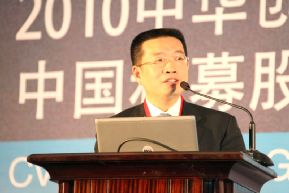
Speakers: Yichen ZHANG, CVCA Chairman / Chief Executive Officer, CITIC Capital
Youxin CHEN, Director and General Manager, China Capital Management Company
Mr. Yichen Zhang, representing CVCA, gave the opening speech. He thanked all the guests for attending this event and sponsors for supporting this summit. He wished this summit to achieve great success.
Afterwards, Mr. Youxin CHEN, representing the Title Sponsor, China Securities Co. Ltd. delivered a welcome speech to express China Security's opinions about the development of VCPE industry in China. He also praised CVCA for organizing this important summit of VCPE industry.

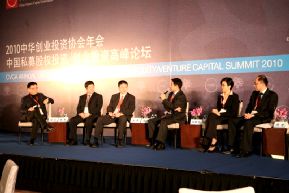
Moderator: Andrew Y. Yan, Managing Partner, SAIF Partners
Panelists:
Yong CUIDirector and Executive Vice President, China Life Asset Management Company Limited
Lei SHIExecutive Director, Bohai Industrial Investment Fund Management Co., Ltd.
Roman SHAWManaging Partner, DT Capital Partners
Cathy ZHANGManaging Director, Jinpu Industrial Investment Fund
Norman ZHONGCounsel, Fangda Partners
Mr. Andrew Yan moderated the panel discussion mainly focusing on channels for RMB fund-raising. The panelists indicated that RMB funds are very popular currently because the industry is quite young. The main resources of RMB fundraising are still state-owned institutions such as the Social Security Fund and China Development Bank which are both relatively mature LPs. Another source is the wealthy elite. The most common way is to cooperate with high-end clients of personal banks such as Minsheng Bank and China Merchants Bank. Meanwhile, the other major part comes from local governments. Mr. Cui, Director and Executive Vice President of China Life Asset Management Company Limited, mentioned that the“Provisional Regulations on Insurance Fund Invested in Private Equity”published by the China Insurance Regulatory Commission in Sep 6, which defined that 5% of the total insurance fund capital could do the equity investment. This regulation is significant for the insurance and PE industry. The panelists speculated that other channels could available for RMB fund-raising besides the social security fund. As a result China's domestic LPs would be more stable and hierarchical.

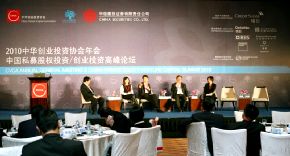
Moderator: Hugo SHONG, Founding General Partner, IDG Capital Partners
Panelists:
Jennifer QINLead Partner, Deloitte's IM industry in Asia Pacific
Chang SUNManaging Director, Warburg Pincus
Sing WANGCo-Chairman, TPG Greater China/Head, TPG Growth North Asia/Partner, TPG
Yingling WEIPartner, Jun He Law Offices
Mr. Hugo SHONG moderated the discussion which was mainly about the supervision of RMB Funds. Mr. Shong also clarified that the purpose of supervision is to create and cultivate a healthy industry and market, as well as to contribute to China's economic growth. GPs would regard the supervisory departments and future LPs as partners but not competitors. For this reasons, communication is very important.
The panelists also reminded that the overheated RMB funds may lead to two problems. First, RMB funds are new and all PE funds have no track record. The industry's reputation would be ruined if not well managed from the outset. Secondly, the investment cycle would be shortened and comprehensive due diligence could not be carried out. VCPE may not provide enterprise with value-added services if the investment cycle is too short. The panelists suggested that fund managers, especially RMB fund managers, could slow and be more cautious. At the same time, a sound reporting system for better communication with investors should be established.
Supervision requires a consideration of the overall situation, including the auditing and legal regulations, fund-raiser's identification, and QFLP etc. PE investment is very active in capital markets. However, the capital markets still serve the economic entity. So if the VC/PE industry acts to stabilize the economic entity, supervision is critical. The industry needs time on the way of normalization.
The parallel discussion was a new component during the summit. A host moderated the discussion among guest speakers, and the audience could join the discussion and interact with the speakers.

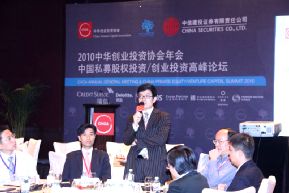
Moderator: Eric CHAN, Chief Financial Officer, CITIC Capital
Guest Speakers:
York CHENFounding Managing Partner, iD TechVentures Ltd.
Richard GUOPartner, Fangda Partners
Jun LIUVice President and Assistant General Counsel, Warburg Pincus
Pauline ZHANGTax Partner, Tax Leader of Greater China in charge of VC/PE tax services, Deloitte
Mr. Eric CHAN hosted the roundtable discussion focusing on legal and tax issues and confusion during RMB fund operation.
Considering the tax issue, RMB fund can be established as a corporation, partnership, and joint venture. Foreign VCPE funds will choose based on their different situations. The managers of Foreign VCPE funds will also consider the local tax regulations. In recent years, many tax privileges were enacted to attract foreign investment. However, the tax regulations, especially the terms on tax refund are different among provinces. Fund manager needs to understand it carefully.
The first legal issue is how to set up a pure RMB fund. The regular way is to establish a GP, in the format of a limited partnership with a foreign fund to manage the fund. If the foreign capital is only 1%, will this confuse the identity of the whole fund? There should be clarification on this issue. The other question is whether the RMB fund has a conflict of interest with foreign funds. The legal experts participating in this panel believed this to be a minor issue. They felt there are a myriad of foreign funds which will exist and they could definitely share a part of the market with RMB funds.

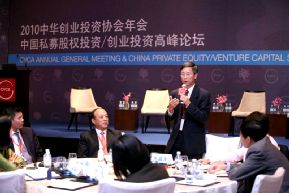
Moderator: Jing HUANG, Managing Director, Bain Capital
Guest Speakers:
Eric CHAITalent & Rewards Leader, Towers Watson
C.K. TSANGOperating Partner, TPG
Rebecca XUCo-Founder and Managing Director, Asia Alternatives
Fumin ZHUOFounding Partner, GGV Capital
Mr. Jing HUANG hosted the roundtable focusing on the topic of CEOs, Partners and Fund Operation Management. The panelists indicated that the internal operation and human resource management of GP is an important part of due diligence for LP and GP. LPs are concerned with the following issues:
The quality of the CFO team, including the CFO
The process of backstage operations
Personnel ratios: different funds have different investment strategies which make the internal operation and the team different.
LP generally invests in a team with a proven history and is also concerned whether those people who achieved success previously are still working in this current team.
Salary and compensation system: Is the benefit distribution fair and reasonable among the partners? The fund should establish an appropriate incentive system to keep talented high performers.

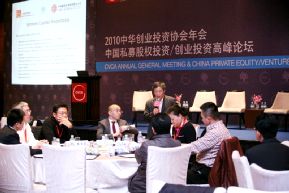
Moderator: Duane KUANG, Founding & Managing Director, QiMing Venture Partners
Guest Speakers:
Fan BAOFounder and CEO, China Renaissance Partners
Ron CAOManaging Director, Lightspeed Venture Partners
Zhongcheng TANGPartner, Cowin Capital
Kathy XUFounder & Managing Partner, Capital Today Group
Jeffrey ZENGGeneral Manager and Managing Partner, Kaixin Investment
Wei ZHOUPartner, KPCB China
Allen ZHUPartner, GSR Ventures
Mr. Duane KUANG hosted the roundtable discussion on the latest trends in the venture capital industry. Guest speakers shared their experiences and insights with audience.
First, early stage investment still has advantages. Investors may have no chance and relationship for investing in some late stage enterprises. It also may not be profitable to invest at a later stage either. Investing in early stage can establish a closer relationship between investors and entrepreneurs.
Second, early stage investment is still commonplace. The return on investments in early stages decreased in the US, because their industry developed too fast which attracted too many practitioners and too much capital. The team explosion lowered the deal quality. Then, high-tech industry had its development cycle. The bottom of this cycle resulted in losses.
Third, early stage investments of RMB funds and foreign funds are different. Since the launch of ChiNext, some deals which were early stage projects in the view of USD funds had quick initial public offerings. The definition of early stage is unclear in China. The fund cycle for RMB funds is shorter than USD fund. Moreover, the expectation of RMB fund's LPs is higher. These reasons caused that it is difficult to invest in early stage enterprises for RMB fund managers.
Finally, early stage investment still needs support from the Chinese government.

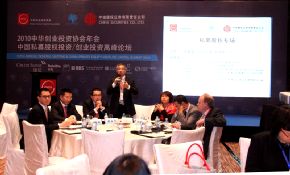
Moderator: Yichen ZHANG, Chief Executive Officier, CITIC Capital
Guest Speakers:
Youxin CHENDirector and General Manager, China Capital Management Company
Xihong DENGManaging Director, Hony Capital
Iain N. DRAYTONHead of the Financial Sponsors Group, Goldman Sachs
Xinghong HUAManaging Director,Head of Beijing Office, Cerberus Asia Operations & Advisory Limited
Vincent HUANGPartner, Pantheon
Mike NETTERFIELDManaging Director and Head of TMT & Financial Investors Coverage, Asia, RBS
Mr. Yichen ZHANG hosted this roundtable dealing with the overall situation of Private Equity.
Private equity aroused dramatically impact in 2010 due to the lively A-share and ChiNext capital markets. The panelists indicated that the most important issue facing the PE industry is persistence in value investments and the provision of value-added services. PE not only provides capital, but more importantly shares expertise and experience with enterprises. PE assists with enterprise development by upgrading internal governance, management and operations. On the other hand, PE consults on enterprise's mergers and acquisitions in both domestic and international markets. The market integration helps enterprises expand and promotes efficiency. PE's core values lie in providing value-added services and maintaining the enterprise's development of profitability. With enterprise growth, investors will be rewarded.

CVCA 2010 Annual General Meeting was held successfully. CVCA Chairman, Mr. Yichen ZHANG, announced that CVCA would be renamed as China Venture Capital and Private Equity Association, although its abbreviation and logo will remain unchanged. To better demonstrate CVCA' s member composition and to represent the private equity members in the Greater China region, the resolution of CVCA renaming, which was proposed by the Board of CVCA Governors, was unanimously approved by a general assembly session of its members.
During annual governor election, Mr. Maurice Hu, CVCA legal counsel and Partner of Orrick, Herrington & Sutcliffe, announced all other governors will continue to serve on the board, except for Mr. TIAN Suning, Chairman of CBC Capital who resigned from the board for personal reasons. CVCA is grateful for Mr. Tian's contribution to CVCA during his term as a board member in the past. Mr. C.K Tsang, CVCA Treasurer, reported on CVCA's financial status for the past year to members.